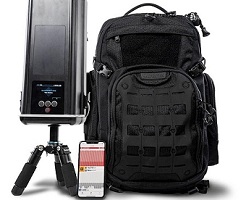Teledyne Flir has released the Identifinder R700 Backpack Radiation Detector, an advanced mobile system that offers unparalleled capability for broad-area radiological monitoring missions, and the U.S. Department of Homeland Security has placed the first order for the device as part of its Helium-3 Alternative Implementation Backpack Program (HAIBP). Programmed out of the Counter Weapons of Mass Destruction office, the $6.5 million award spans nine months of product deliveries.
Building on the technology of the award-winning Identifinder R440, the R700 offers increased sensitivity and speed for identifying radioactive threats using advanced spectroscopic algorithms and detection techniques. The R700’s flexible and portable design allows users to configure the system as either a backpack or a stationary device, enabling mission sets from wide area searches to temporary checkpoints.
“The Identifinder R700 gives public safety agencies a powerful new tool with unmatched capabilities to screen large areas for radiation quickly,” said Dr. David Cullin, VP for Detection Systems at Teledyne Flir. “With its connected mobile phone app and low profile backpack, radiation threats can be detected, identified and tracked discreetly at mass gatherings, transportation hubs, or public events.
“Teledyne is proud to partner with the Department of Homeland Security to help it bring a higher level of performance and coverage to those who protect lives and livelihoods by serving as America’s first line of defense,” Cullin added.
The Identifinder R700 is the most sensitive radiation detection system in the company’s line-up. When coupled with Teledyne Flir’s other best-selling Radionuclide Identification Devices (RIDs) or Spectroscopic Personal Radiation Detectors (SPRDs), organisations will have a comprehensive person-borne radiation screening system that can provide personal protection, point detection, and wide-area screening.
As with all Teledyne Flir radiation detection systems, the R700 provides the capability to do so in real-time and on-demand. The instrument can be monitored and controlled remotely using the mobile phone application. Built in wireless communications and a robust API also allow integration with user-deployed networks.








